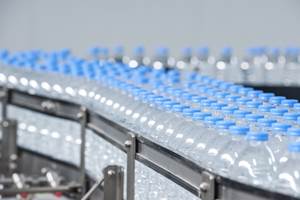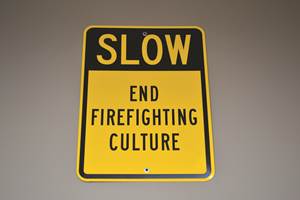Meet Debbie Freligh
Debbie Freligh has an AS in Engineering Science, a Master Molder I, a Quality Management Certificate, numerous plastics CE seminars, a Master Molder II and a BSME from the University of Hartford is in progress.
Debbie Freligh has an AS in Engineering Science from QVCC, a Master Molder I from Nypro University/MWCC, a Quality Management Certificate from CCAT, numerous plastics CE seminars at UMass Lowell, a Master Molder II from Nypro University/MWCC earned this month, and a BSME from the University of Hartford is in progress.
With all of this training under her belt, Debbie sees herself working as the VP of Operations, Plastics at Westminster Tool in the next five years, responsbile for developing and improving all procedures for the design, manufacture, quality and validation of injection molds; training, development and supervision of project management, quality assurance and injection molding personnel for plastics tooling.
She believes that the greatest aspect of working at Westminster is the encouragement she receives to continue her education with formal university class work, as well as job-specific training such as the Master Molder and Quality Management certifications. The empowerment of all employees by management to make decisions in their everyday workload, as well as long-term career goals is outstanding.
Here is a little more Q&A:
Q. How/why did you go into manufacturing?
A. I returned to college in my late thirties to complete a BA in Business Management, and was introduced to engineering by a math professor. After doing a cost-benefit analysis of changing my major to engineering, I realized that an engineering/manufacturing position would be ideal for me not only financially, but would also be an intellectually challenging way to make a difference in the lives of others. Plus, I thought that an engineering degree was “sexier” than a business degree.
Q. How did you get into moldmaking?
A. I won a scholarship offered by QMI (now EAMA), and met Ray Coombs, Westminster Tool’s owner. He hired me about a year later, and his passion for moldmaking was infectious.
Q. What is the greatest asset you bring to Westminster?
A. I came to Westminster with a background in banking and insurance, both highly regulated industries that require a high degree of attention to detail. I think my greatest asset is my ability to apply my experience and education to solve day-to-day issues and make improvements to existing processes.
Q. What do you believe is the industry's greatest challenge?
A. Definitely the shortage of new talent, specifically toolmakers.
Q. What is your favorite part of the job?
A. Being able to work directly with customers and other Westminster Tool employees to solve problems – or better yet, identify potential problems before they occur – and always having something different to do every day.
Q. What is the most important thing you have learned so far?
A. That I’m never done learning – there is always something new happening in plastics. I am surrounded by smart, knowledgeable people every day - our customers, suppliers, and other Westminster employees - and I try to learn something new from these people each day.
Q. Do you read MoldMaking Technology?
A. Yes. I like that it includes articles about different phases of a mold build--DFM, flow analysis, new innovations in design techniques, components, inspection, and validation. In my role as Project Manager, I think it’s important to be up to speed on all of these issues, and reading MoldMaking Technology each month is an excellent way to do this. I would like to see an Education/Training page that lists available courses, webinars, and scholarship opportunities.
Q. How does it feel to be a woman in manufacturing / moldmaking?
A. It’s unfortunate that this question needs to be asked and answered. I don’t consider myself a “woman engineer”, I am an engineer. I understand that the purpose of the question is to encourage women to enter these types of professions by hearing from other women who are doing this type of work already, but I would hope that it feels the same as being a man in manufacturing/moldmaking. Westminster Tool’s culture is one of inclusion and encouragement, and I have never felt that I was treated differently, or that the expectations for the quality of my work were different, because I am a woman. That being said, I think working in a male-dominated profession is very empowering, and something I’m proud of.
Q. What female influences brought you to manufacturing?
A. None really. However, I have met many talented and intelligent women in this industry since I have been working at Westminster. I was one of the first women to work full-time at Westminster Tool in a technical capacity, and I try to encourage female manufacturing and engineering students who come through the facility on tours to keep in touch and reach out to me for advice, referrals, etc.
Q. How do you see women in manufacturing in the future?
A. I definitely see an increase in the number of women who will choose manufacturing as a career option. As more of us become successful and attain leadership positions in the industry, my hope is that we will use that exposure to share our experiences and discuss our setbacks with the next generation of women who are just starting out. As far as how our role will change, I am hopeful that in the near future, we will no longer be considered “trailblazers.” Rather, we will simply be considered co-workers, respected peers, and successful leaders.
Related Content
Confronting the Mold Design Talent Drought
Recently, I reposted on LinkedIn the results of an informal survey we conducted, which revealed a shortage of skilled mold designers. It quickly gained a lot of traction. Given the response, I thought I'd summarize the feedback and keep the conversation going.
Read MoreWhat is Driving Mold Lifecycle Management Digitalization?
OEMs are looking to partner with suppliers to share and track data across the supply chain for advanced intervention and process management.
Read MoreHands-on Workshop Teaches Mold Maintenance Process
Intensive workshop teaches the process of mold maintenance to help put an end to the firefighting culture of many toolrooms.
Read MoreMaking Quick and Easy Kaizen Work for Your Shop
Within each person is unlimited creative potential to improve shop operations.
Read MoreRead Next
Are You a Moldmaker Considering 3D Printing? Consider the 3D Printing Workshop at NPE2024
Presentations will cover 3D printing for mold tooling, material innovation, product development, bridge production and full-scale, high-volume additive manufacturing.
Read MoreHow to Use Continuing Education to Remain Competitive in Moldmaking
Continued training helps moldmakers make tooling decisions and properly use the latest cutting tool to efficiently machine high-quality molds.
Read MoreHow to Use Strategic Planning Tools, Data to Manage the Human Side of Business
Q&A with Marion Wells, MMT EAB member and founder of Human Asset Management.
Read More




















